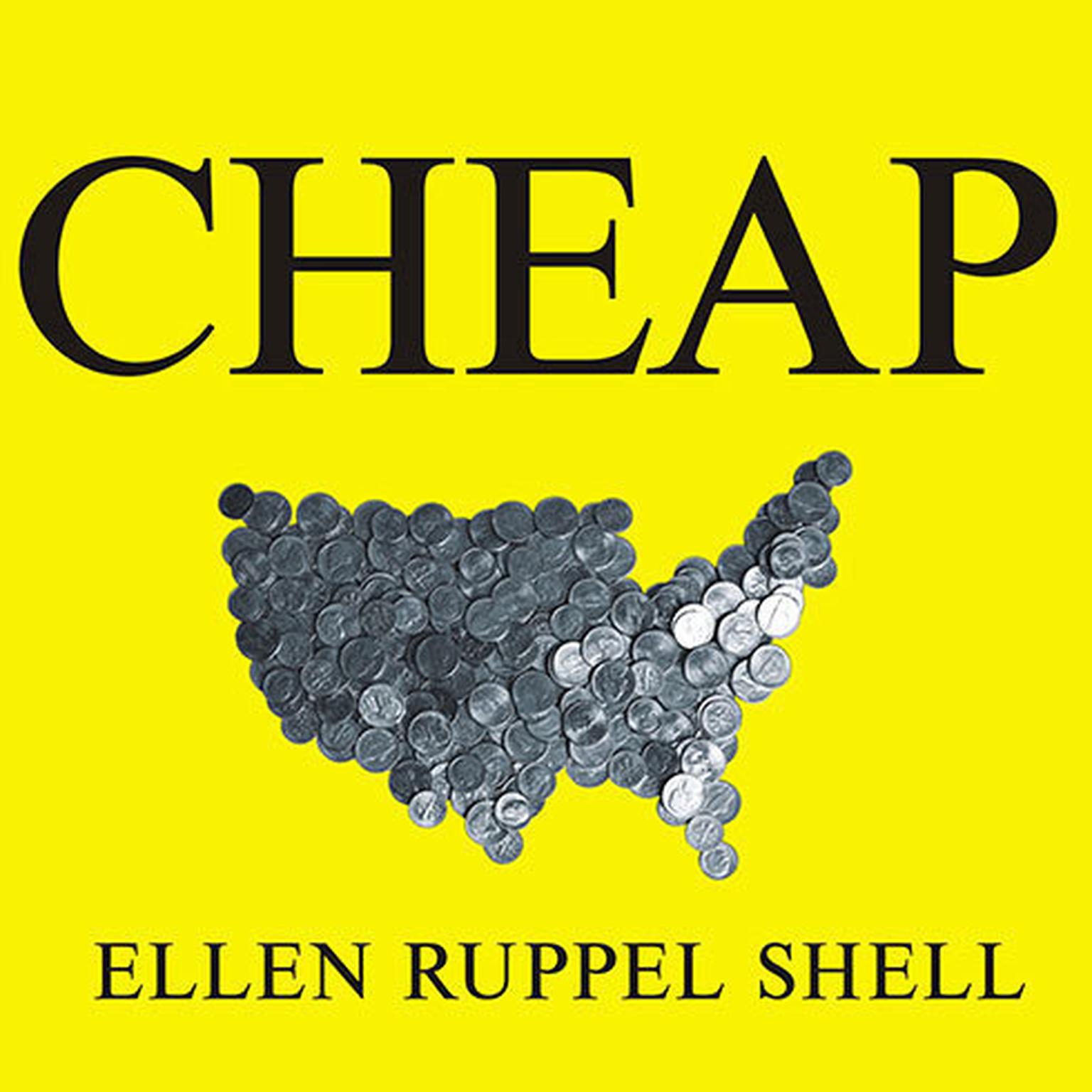 Play Audiobook Sample
Play Audiobook Sample
Cheap: The High Cost of Discount Culture Audiobook
 Play Audiobook Sample
Play Audiobook Sample
Quick Stats About this Audiobook
Total Audiobook Chapters:
Longest Chapter Length:
Shortest Chapter Length:
Average Chapter Length:
Audiobooks by this Author:
Publisher Description
From the shuttered factories of the rust belt to the look-alike strip malls of the sun belt—and almost everywhere in between—America has been transformed by its relentless fixation on low price. This pervasive yet little examined obsession is arguably the most powerful and devastating market force of our time—the engine of globalization, outsourcing, planned obsolescence, and economic instability in an increasingly unsettled world.
Low price is so alluring that we may have forgotten how thoroughly we once distrusted it. Ellen Ruppel Shell traces the birth of the bargain as we know it from the Industrial Revolution to the assembly line and beyond, homing in on a number of colorful characters, such as Gene Verkauf (his name is Yiddish for "to sell"), founder of E. J. Korvette, the discount chain that helped wean customers off traditional notions of value. The rise of the chain store in post-Depression America led to the extolling of convenience over quality, and big-box retailers completed the reeducation of the American consumer by making them prize low price in the way they once prized durability and craftsmanship.
The effects of this insidious perceptual shift are vast: a blighted landscape, escalating debt (both personal and national), stagnating incomes, fraying communities, and a host of other socioeconomic ills. That's a long list of charges, and it runs counter to orthodox economics, which argues that low price powers productivity by stimulating a brisk free market. But Shell marshals evidence from a wide range of fields—history, sociology, marketing, psychology, even economics itself—to upend the conventional wisdom. Cheap also unveils the fascinating and unsettling illogic that underpins our bargain-hunting reflex and explains how our deep-rooted need for bargains colors every aspect of our psyches and social lives. In this myth-shattering, closely reasoned, and exhaustively reported investigation, Shell exposes the astronomically high cost of cheap.
Download and start listening now!
"Unlike the many repetitive, windy nonfiction books these days that seem written for a reader with a short attention span whom they expect not to read cover to cover, this was a delight. Concise, elegant, well-researched and persuasive, it does not hand you answers but provokes you to think long and hard about your values and what changes you are prepared to make to live them in practice. It also lifts the lid off a variety of deceptive and hidden retail practices. I wanted to choose a particularly memorable quote to share but nearly every page offered several choices, so I quickly gave up. Strongly recommended for anyone who ever sets foot in a store."
— Laura (5 out of 5 stars)
Quotes
-
“This highly intelligent and disturbing book provides invaluable insight into our consumer culture and should be mandatory reading for anyone trying to figure out our current financial mess. As Shell proves, the hunt for cheap products has hurt us all. Highly recommended for smart readers.”
— Library Journal -
Even when you disagree with Ruppel Shell, you'll find yourself learning a great deal and enjoying the experience.
— The Boston Globe -
“Diligent, useful cultural criticism, akin to Eric Schlosser’s Fast Food Nation and Tom Vanderbilt’s Traffic.”
— Kirkus Reviews
Cheap Listener Reviews
-
" Really well researched, and definitely made me pause and think. Made me frustrated with a lot of retail system, too, but I think that was kind of the point. I guess it's a little like "Fast Food Nation", only regarding the retail industry. Almost 4 stars... I need a half-star rating system! "
— Tiffany, 2/8/2014 -
" Not bad. I think the overall premise of the book--that it's a bad strategy to make spending decisions based solely on price--is spot on. The science behind her assertions is slightly more rigorous than typical journalism, but not much. A brain is still required when reading this. "
— Jeff, 2/8/2014 -
" Fascinating, depressing, a little scary. Shows clearly how the American [and increasingly world-wide] obsession with getting the best deal, the lowest price adversely affects workers, farmers, children. To be trite, it is like Dominoes - if I am only willing to pay $1.00 for a pint of strawberries, that affects the profit of the grocery store which affects what they pay their workers and also what they pay their suppliers. It is much more complicated than that - what effect does Wal-Mart really have locally and internationally? I would have given it 4 stars, but some of the data she quotes is 10 years old - though that may well be the most recent data that is available. And she really doesn't offer much in the way of solutions. For me, look harder for US-made products [good luck, Louise] and shop more at farmers' markets, as well as expand what I grow myself. "
— Helen-Louise, 2/6/2014 -
" I thought that I knew some of the costs to our society ( and other societies ) by being barraged by discounted items, mainly from countries that have low wages. I have learned that it impacts all of us, from low wage workers in Thailand to middle America. This is a very good book for truly understanding where we are now and how to change the world. Very good book "
— Marty, 2/1/2014 -
" This is making me rethink everything I think I want to buy. This is good. "
— Dayna, 1/27/2014 -
" Good documentation of what most of us have probably already suspected, there's no free lunch (or cheap lunch for that matter). "
— Kitty, 1/26/2014 -
" An examination of what's behind super low prices. A good book for anyone interested in responsible consumerism. "
— jen8998, 1/8/2014 -
" Great introduction to the unsustainability of our culture. I only wish the author had provided more information to the reader that there is a SUSTAINABILITY movement, that there are answers. Simple things people can do. "
— Axydlbaaxr, 12/30/2013 -
" AMAZING! Well written, easy to read, and SO informative. If you aren't ready to change your buying habits, then don't read this book. It gives you hope for a better quality America. "
— Bethanie, 11/5/2013 -
" Very thought provoking! I have never been a fan of Walmart, but this book goes beyond that and really makes you think about the cheap goods we buy...is it wroth out on the long run? I think not, but avoiding it on every level is SO hard!! "
— Lisa, 10/1/2013 -
" If you want to understand how things got to this point read this book. Fascinating! "
— Mike, 5/22/2013 -
" it's more than a marketing lesson. we see the pros and cons of discount culture and its influence. "
— Linh, 12/23/2012 -
" Very comprehensive and sobering, though a bit dry. "
— Margie, 10/7/2012 -
" A couple of compelling chapters but not much else. For all the effort she put into the history of how we got to where we are, she offered at best four paragraphs of solutions. That is not acceptable. Don't waste my time complaining able the ills unless you have a concrete road map to recovery. "
— Marc, 8/21/2012 -
" This is fairly dense reading but very interesting. Everyone who likes to get a 'bargain' should read this book "
— Jan, 2/25/2012 -
" Meh. Not that insightful and overuse of the generalized word 'cheap' to really carry a lot of weight--a large guilt trip sentiment. "
— Chad, 4/19/2011 -
" Not a bad book, but "The Story of Stuff" discusses the same phenomenon in a more interesting and thorough way. "
— Sara, 3/22/2011 -
" Much of the economics in this well-written book were beyond me, but they still rang true, and the anthropological aspects of it were fascinating..... and scary. I'd highly recommend it. "
— Patricia, 3/5/2011 -
" This is a great book to get you thinking about our economy and our purchases from food to houses.<br/>Everyone should read it. "
— Kathy, 3/3/2011 -
" We read this for book club and it was a fasinating book! Really makes you think about all those bargains. "
— Jennifer, 2/5/2011 -
" Awesome discussion of the discount retail culture and some of the players (some surprising!). "
— Elizabethleenhouts, 2/4/2011 -
" I wish this book offered more tangible solutions, as opposed to just being more conscious of what we buy, but it makes the fantastic point that buying cheap items isn't the same as getting us deals, and that access to cheap goods have made us poorer, not wealthier, in the long run. "
— Sarah, 1/25/2011 -
" Brought a magnifying class to buying cheap. Interesting, but tends to ramble at times "
— Evelynxue, 1/21/2011 -
" It is good so far. A decent look into how the US economy is being held hostage by retailers and discounters. "
— Cyberhiker, 1/12/2011
About Ellen Ruppel Shell
Ellen Ruppel Shell is a correspondent for the Atlantic Monthly magazine and has written about science and medicine for the New York Times magazine, the Washington Post, National Geographic, Time, Discover, the Boston Globe, and dozens of other national publications. She is also the author of The Hungry Gene, which has been published in six languages. Shell is a professor of journalism at Boston University, where she codirects the graduate program in science journalism.
About Lorna Raver
Lorna Raver, named one of AudioFile magazine’s Best Voices of the Year, has received numerous Audie Award nominations and many AudioFile Earphones Awards. She has appeared on stage in New York, Los Angeles, and regional theaters around the country. Among her many television credits are NYPD Blue, Judging Amy, Boston Legal, ER, and Star Trek. She starred in director Sam Raimi’s film Drag Me to Hell.





